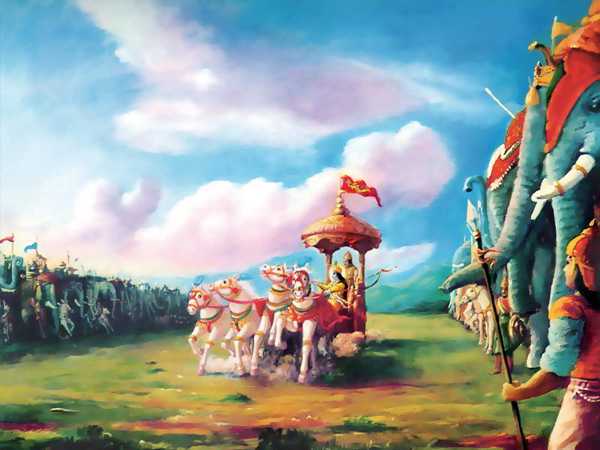Chapter 69

“Dhritarashtra said, ‘How hast thou, O Sanjaya, been able to know Madhavaas the Supreme Lord of the universe? And how is it that I am unable toknow Him as such? Tell me this, O Sanjaya.’
“Sanjaya said, ‘Listen, O king! Thou hast no Knowledge, whereas myKnowledge hath suffered no diminution. He that is without Knowledge andis shrouded with the darkness of ignorance, knoweth not Kesava. Aided bymy knowledge, O sire, I know the slayer of Madhu to be the union of theGross, the subtle and the Cause; and that He is the Creator of all, butis Himself increate; and also that, endued with Divinity, it is He fromwhom everything springs and it is He unto whom all things return.’
“Dhritarashtra said, ‘O son of Gavalgana, what is the nature of thatFaith which thou hast in Janardana and in consequence of which thouknowest the slayer of Madhu to be the union of the Gross, the Subtle, andthe Cause?’
“Sanjaya said, ‘Blessed be thou, O king, I have no regard for theillusion (that is identified with worldly pleasures) and I never practisethe useless virtues (of vows and work without reliance on Him and purityof Soul). Having obtained purity of Soul through Faith, I have knownJanardana from the scriptures.
“Dhritarashtra said, ‘O Duryodhana, seek thou the protection ofJanardana, otherwise called Hrishikesa. O child, Sanjaya is one of ourtrustiest friends. Seek refuge with Kesava.’
“Duryodhana said, ‘If the divine son of Devaki united in friendship withArjuna, were to slay all mankind, I cannot, even then, resign myself toKesava.’
“Dhritarashtra said, ‘This evil-minded son of thine, O Gandhari, isresolved to sink in misery. Envious, wicked-souled, and vain, he settethaside the words of all his superiors.’
“Gandhari said, ‘Thou covetous wretch that disregardest the commands ofthe aged, abandoning thy father and myself and giving up prosperity andlife, enhancing the joy of thy foes, and afflicting me with deepdistress, thou wilt, O fool, remember thy father’s words, when struck byBhimasena, thou wilt bite the dust.’
“Vyasa said, ‘Listen to me, O king! Thou, O Dhritarashtra, art thebeloved of Krishna. When Sanjaya hath been thy envoy, he will verily leadthee to thy good. He knoweth Hrishikesa,–that ancient and exalted One.If thou listenest to him with attention, he will certainly save thee fromthe great danger that hangs upon thee. O son of Vichitravirya, subject towrath and joy, men are entangled in various snares. They that are notcontented with their own possessions, deprived of sense as they are byavarice and desire, they repeatedly become subject to Death inconsequence of their own acts, like blind men (falling into pits) whenled by the blind. The path that is trod by the wise is the only one (thatleadeth to Brahma). They that are superior, keeping that path of view,overcome death and reach the goal by it.’
“Dhritarashtra said, ‘Tell me, O Sanjaya, of that path without terrors bywhich, obtaining Hrishikesa, salvation may be mine.’
“Sanjaya said, ‘A man of uncontrolled mind can by no means know Janardanawhose soul is under perfect command. The performance of sacrificeswithout controlling one’s senses is even no means to that end.Renunciation of the objects of our excited senses is due to spirituallight; both spiritual light and abstention from injury arise doubtlessfrom true wisdom. Therefore, O king, resolve to subdue thy senses withall possible vigour; let not thy intellect deviate from true knowledge;and restrain thy heart from worldly temptations that surround it. LearnedBrahmanas describe this subjugation of the senses to be true wisdom; andthis wisdom is the path by which learned men proceed to their goal. Oking, Kesava is not obtainable by men who have not subdued their senses.He that hath subdued his senses, desireth spiritual knowledge, awakenedby the knowledge of scriptures and the pleasure of Yaga-absorption.’




